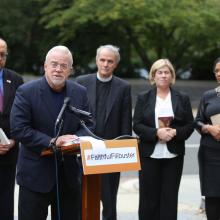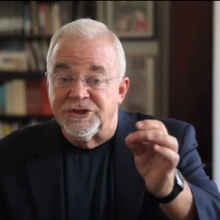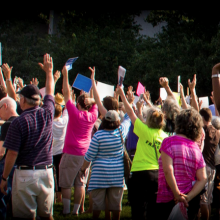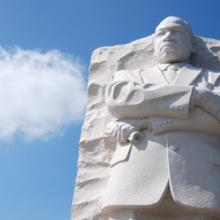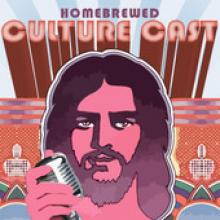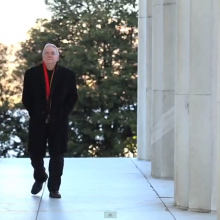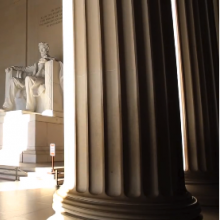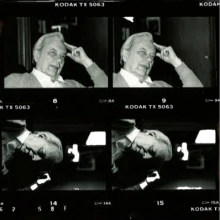jim wallis
The most controversial sentence I ever wrote, considering the response to it, was not about abortion, marriage equality, the wars in Vietnam or Iraq, elections, or anything to do with national or church politics. It was a statement about the founding of the United States of America. Here’s the sentence:
"The United States of America was established as a white society, founded upon the near genocide of another race and then the enslavement of yet another."
The comments were overwhelming, with many calling the statement outrageous and some calling it courageous. But it was neither. The sentence was simply a historical statement of the facts. It was the first sentence of a Sojourners magazine cover article, published 26 years ago titled “America’s Original Sin: The Legacy of White Racism.”
An extraordinary new film called 12 Years a Slave has just come out, and Sojourners hosted the premiere for the faith community on Oct. 9 in Washington, D.C. Rev. Otis Moss III was on the panel afterward that reflected on the film. Dr. Moss is not only a dynamic pastor and preacher in Chicago, but he is also a teacher of cinematography who put this compelling story about Solomon Northup — a freeman from New York, who was kidnapped and sold into slavery — into the historical context of all the American films ever done on slavery. 12 Years is the most accurate and best produced drama of slavery ever done, says Moss.
In her New York Times review, “ The Blood and Tears, Not the Magnolias,” Manohla Dargis says, 12 Years a Slave “isn’t the first movie about slavery in the United States — but it may be the one that finally makes it impossible for American cinema to continue to sell the ugly lies it’s been hawking for more than a century.” Instead of the Hollywood portrayal of beautiful plantations, benevolent masters, and simple happy slaves, it shows the utterly brutal violence of a systematic attempt to dehumanize an entire race of people — for economic greed. It reveals how morally outrageous the slave system was, and it is very hard to watch.
Under a cloudy and drizzly sky, across the street from the U.S. Capitol, David Beckmann read passages from the prophet Isaiah.
“Comfort, comfort my people, says your God,” read Beckmann, president of Bread for the World and one of several Protestant and Catholic leaders who gathered Wednesday to launch “Faithful Filibuster.”
The effort is intended to remind members of Congress that the government shutdown is hurting poor and vulnerable people.
Jim Wallis sat down to discuss the government shutdown. His conclusion? It's unbiblical.
Last night, Jim Wallis appeared on "The Ed Show" to discuss why it's imperative to avoid cutting social programs like food stamps that feed millions of poor and hungry in our country. Those pastors who disagree, he says, usually don't know the faces of those directly affected by such cuts. You can watch the segment Jim appeared on here:
Yesterday was the 50th anniversary of a day that changed America, changed the world, and changed my life forever. I was fourteen years old on Aug. 28, 1963, in my very white neighborhood, school, church, and world. But I was watching. The Rev. Dr. Martin Luther King, Jr., became a founding father of this nation on that day, so clearly articulating how this union could become more perfect.
He didn’t say, “I have a complaint.” Instead, he proclaimed (and a proclamation it was in the prophetic biblical tradition), “I have a dream.” There was much to complain about for black Americans, and there is much to complain about today for many in this nation. But King taught us that day our complaints or critiques, or even our dissent will never be the foundation of social movements that change the world — but dreams always will. Just saying what is wrong will never be enough the change the world. You have to lift up a vision of what is right.
The dream was more than the Civil Rights Act and the Voting Rights Act, which both followed in the years after the history-changing 1963 March on Washington for Jobs and Freedom. It finally was about King’s vision for “the beloved community,” drawn right from the heart of his Christian faith and a spiritual foundation for the ancient idea of the common good, which we today need so deeply to restore.
Sojourners president Jim Wallis was recently a guest on HBO's "Real Time with Bill Maher." In the course of the show Maher confronted Wallis on the Bible, asking him some very pointed questions about some of its more troubling texts. You can watch the exchange HERE.
Maher asks, "How do you reconcile this idea that it all comes from the Bible, but the Bible is so flawed... I mean, it's just so full of either nonsense or viciousness." In response, Wallis steered the conversation back to the topic of social justice and compassion, often overlooked Biblical mandates. Maher objected several times, accusing Wallis of "cherry-picking the good parts" of the Bible while ignoring the bad parts.
I'm a big fan of Jim Wallis (heck, I blog for Sojourners!), and I appreciate that he moved the conversation away from Maher's attempted divisiveness and back to caring for the poor and immigration reform in this country. He's totally right that caring for the marginalized should be the priority of us Christians, and I understand that he wanted to stay focused on that.
At the same time, I think the question Bill Maher was raising is an important one, too, because it ultimately has to do with caring for the marginalized as well. That is, when the Bible is read in a hurtful way, it can and has been used throughout history to justify horrendous violence and mistreatment. That matters, and consequently it matters how we read the Bible. So as someone who has focused on confronting those "bad parts" in Scripture, I wanted to take a stab at addressing Maher's questions.
“This is a day that the Lord has made.”
Those words begin a very popular worship song among evangelical Christians. And they were the first words that came to my mind when I stood alongside the widest spectrum of evangelical leaders we have ever seen at a gathering yesterday morning on the West Lawn of the U.S. Capitol. We were there to lead a day of prayer and discussion with the leaders of the House of Representatives about the urgent need for comprehensive immigration reform — more specifically to fix a system that is not only broken, but cruel for millions of people.
The whole day was sponsored and led by the Evangelical Immigration Table, one of the most hopeful signs in many years of how Christians can come together to make a difference. At the press conference, Christianity Today editor Andy Crouch, speaking as a journalist, said he has never seen such evangelical unity over any other issue
.
Once we have decided to follow Jesus, we cannot help but live out our personal beliefs in public ways. The demands of the Gospel refuse us the option of a purely inward spirituality.
While there are times when those in power listen to the guidance of moral and religious leaders, far too often we’re asked to be prophets. In the face of opposition, we pick up our crosses and lift up our voices on behalf of the disadvantaged.
In North Carolina, pastors and civil rights leaders, along with thousands of others, have been living out their personal faith in a very public way. Since late April, dozens of faith leaders and hundreds of others have been arrested at the state capitol as part of an ongoing protest call “Moral Mondays.” What would motivate these leaders to take such a strong stand at such a personal cost?
Skepticism is a good and healthy thing, I told every audience. Be skeptical and ask the hard, tough questions about our institutions — especially Washington and Wall Street. But cynicism is a spiritually dangerous thing because it is a buffer against personal commitment. Becoming so cynical that we don’t believe any change is possible allows us to step back, protect ourselves, grab for more security, and avoid taking any risks. If things can’t change, why should I be the one to show courage, take chances, and make strong personal commitments? I see people asking that question all the time.
But personal commitment is all that has ever changed the world, transformed human lives, and altered history. And if our cynicism prevents us from making courageous and committed personal choices and decisions, the hope for change will fade. Along the way, I got to thinking how the powers that be are the ones causing us to be so cynical. Maybe that is part of their plan — to actually cause and create more cynicism in order to prevent the kind of personal commitments that would threaten them with change.
And this is where faith comes in.
Editor’s Note: Jim Wallis’ latest book On God’s Side: What Religion Forgets and Politics Hasn’t Learned About Serving the Common Good is sparking a national conversation of what it means to come together on issues that traditionally divide the nation. Bloggers Adam Ericksen and Tripp Hudgins are having that conversation here, on the God’s Politics blog. Follow along, and join the discussion in the comments section.
Benedict of Nursia is on my mind this morning as I ponder what it is that Jim Wallis is trying to accomplish with his new book, On God's Side. Adam Ericksen pondered the virtues of baseball, winning, and losing in his post from earlier this week. Adam questioned the metaphor. What do we do with our losers? How can we all win?
What would it mean if people of faith began transferring their human identities from class, racial, and national loyalties to a global identity in a new beloved community created by God?
~ Jim Wallis, On God's Side
Today I'm wondering about where Jim was when he started pulling all of this together. Jim shared that he went on retreat (a good practice, in my humble opinion) to gather his thoughts for this new book. He went to a monastery (also a good practice, in my humble opinion). He prayed the hours. He wandered the grounds. He spent some time in silence. He read the Narnia books and gave some serious thought of C.S. Lewis' Aslan. All of this led to a question, well, many questions, but this question I've pulled out is what caught my attention. What if, indeed, Jim. What if we were to do this thing ... the beloved community?
It is no surprise to me that this question would emerge while Jim was at a monastery. Of course it would. And that he riffs on Dr. Martin Luther King, Jr., in a way is also wonderfully telling. "Our goal is to create a beloved community and this will require a qualitative change in our souls as well as a quantitative change in our lives," said Dr. King. Our souls must change. So too must our lives. Dr. King said much about the beloved community. So too did Benedict of Nursia.
There's so much to say here. I'm a little stumped. The beloved community is the Church, but it is exemplified by the monastery where people relinquish their individual control of their worldly goods. Monastics take vows to pray and work together. There's a shared rhythm of life. There is a shared mission. It's a challenging and difficult life, and not all Christians are called to it. Obedience, stability, conversion of life. If we want to be the beloved community, then the we must avow ourselves to such a Rule. Indeed, we must give up our personal or private identities to the service of all.
But how do we do this as a culture, a global church?
Editor’s Note: Jim Wallis’ latest book On God’s Side: What Religion Forgets and Politics Hasn’t Learned About Serving the Common Good is sparking a national conversation of what it means to come together on issues that traditionally divide the nation. Bloggers Adam Ericksen and Tripp Hudgins are having that conversation here, on the God’s Politics blog. Follow along, and join the discussion in the comments section.
In his post “Lattes for the Common Good,” Tripp states that working for the common good starts in mundane places, like a coffee shop. These are the places where we practice neighborliness. Here’s Tripp’s brilliant point:
I wonder if one of the things that we can think about in terms of the common good is learning to practice neighborliness in the inconsequential moments so that when we face the bigger political difficulties of our shared life — when we start talking about the common good in the larger sense around some of the other issues like violence, and fear, and money — that maybe if we've already built up habits we can have these larger conversations with greater ease.
Jim Wallis says something very similar in his book On God’s Side. When it comes to the common good, Wallis states, “I have never seen the real changes we need come from inside politics. Instead, they come from outside social movements” (295).
According to Wallis, for those social movements to make any real change in our politics they must be based on the biblical command to “love your neighbor as yourself.” Indeed, On God’s Side begins with a reflection on the Golden Rule. And, as Tripp says, “learning to practice neighborliness” is learning to practice loving our neighbor as we love ourselves.
But there is a tension in Wallis’s book that, for me, is unresolved. That tension is clearly seen when Wallis talks about baseball.
Not to get all braggy here, but this episode is pretty great.
First, we have our first return guest, and it’s one of our best: Jim Wallis. Christian moderated a discussion with Jim at Powell’s Books last week to talk about his new book about nurturing the common good, called On God’s Side.
I swear, Jim Wallis is incapable of saying uninteresting things. What an honor to have him back (even if Jordan didn’t get to be there).
We spend the second half of the show talking about bombings and explosions and ricin. I promise, it’s not as depressing as it sounds. Namely, we wanted to talk about racial profiling when it comes to terror suspects, the shifting tectonics of how we get news in America, how to talk about tragedy with children, and how much faith is to blame in religious extremism.
Seriously, even with horribly serious subject matter, this was a really fun show to do and talk about, and we use our senses of humor to cope. We hope you enjoy.
Editor’s Note: Jim Wallis’ latest book On God’s Side: What Religion Forgets and Politics Hasn’t Learned About Serving the Common Good is sparking a national conversation of what it means to come together on issues that traditionally divide the nation. Bloggers Adam Ericksen and Tripp Hudgins are having that conversation here, on the God’s Politics blog. Follow along, and join the discussion in the comments section.
"I'm hesitant to talk about the common good as if it's a discovery. This is not news. But maybe, maybe Jim's right in that we've forgotten how to practice it. So this is what I want to know, invoking the spirit of Fred Rogers as I do it: 'Who is your neighbor?' ... Because I wonder if one of the things that we can think about in terms of the common good is learning to practice neighborliness in the inconsequential moments so that when we face the bigger political difficulties of our shared life — when we start talking about the common good in the larger sense around some of the other issues like violence, and fear, and money — that maybe if we've already built up habits we can have these larger conversations with greater ease."
The common good is not only about politics. The common good is about life and how we live it. It is ultimately about how we are all connected. It is about how our love or lack of love affects our families, our neighbors, our communities, our cities, our nation, and our world.
The common good is about personal brokenness. Have we taken the time to let Jesus come in and heal the wounds that distort the image of God within of us — wounds that drive daughters and sons, mothers and fathers to self-destruction? Have we taken the time to let the Great Physician heal the personal wounds that break families and friendships, slicing the central fabric of society? We are all connected.
I recently went back to the Lincoln Memorial to tell the story of how and why I wrote my new book, On God’s Side: What Religion Forgets and Politics Hasn’t Learned About Serving the Common Good. And I reflected on my favorite Lincoln quote, displayed on the book’s cover:
“My concern is not whether God is on our side: my greatest concern is to be on God’s side.”
I invite you to watch this short video, and to engage in the discussion as we move forward toward our common good. Blessings.
Sojourners President and CEO Jim Wallis sat down with George Stephanopoulos on ABC's 'This Week' to discuss his latest book On God's Side: What Religion Forgets and Politics Hasn't Learned About Serving the Common Good.
He joined a roundtable of guests to discuss themes in his book, as well as engage in a broader discussion about the Common Good.
A revealing thing happens when you remove yourself from the daily drum of politics and become a mere observer. I did just that last year, during some of the most divisive moments of the presidential election. Sitting back and watching the deluge of insults and accusations that feeds our political system, I witnessed the worst of us as a nation. And I came to the conclusion that it’s time to reframe our priorities.
When did we trade the idea of public servants for the false idols of power and privilege? When did we trade governing for campaigning? And when did we trade valuing those with the best ideas for rewarding those with the most money?
We’ve lost something as a nation when we can no longer look at one another as people, as Americans, and — for people of faith — as brothers and sisters. Differing opinions have become worst enemies and political parties have devolved into nothing more than petty games of blame.
During a three-month sabbatical, observing this mess we’ve gotten ourselves into, I prayed, meditated, read — and then I put pen to paper. The resulting book gets to the root of what I believe is the answer to our current state of unrest. It is not about right and left — or merely about partisan politics — but rather about the quality of our life together. It's about moving beyond the political ideologies that have both polarized and paralyzed us, by regaining a moral compass for both our public and personal lives — by reclaiming an ancient yet urgently timely idea: the common good.
It’s a constant story line involving powerful men in politics, sports, business, and even religion: they behave with utter disregard for the dignity and humanity of women, using and abusing them at will, and somehow believe that — as men — they are entitled to do so. These men seem to think that the ordinary rules of decent behavior do not apply to them. We have a never-ending avalanche of disgusting stories about men cheating on their spouses and the mothers of their children, abandoning old wives for new ones, practicing serial philandering as a way of life, sexually harassing and assaulting women, physically abusing them, and even committing rape.
And now we have the boys, high school football players from Steubenville, Ohio. As a father of two boys, one now a high school athlete, and as a Little League baseball coach, I was especially fixed on this very sad and brutal story of a 16-year-old girl being sexually assaulted by two high school football players after she had passed out from drinking too much. When the girl woke up the next morning, she was horrified to see herself naked all over social media with Tweets everywhere about her and what had happened, from the boys who assaulted her and those who watched. The boys’ lawyers pleaded that she didn’t say no; but the judge concluded that when you assault a girl who is unconscious, and can’t say no; it’s called rape.
The judge made the right decision. Rape is rape.
Last Wednesday morning, the Sojourners community lost an extraordinary friend with the passing of Gordon Cosby. In honor of the life and witness of this beloved brother of Christ, we offer this roundup of stories written by and about Gordon Cosby and his wife Mary.
Driven by our moral call to protect each member of our society, people of faith have been outspoken about the need to craft meaningful legislation to reduce gun violence. This week, Mayors Against Illegal Guns released an ad featuring a diverse group of religious leaders, including Sojourners CEO and President Jim Wallis, leaders to demand that Congress make common-sense reforms to our nation’s legislation that is failing to keep us safe.
The faith community continues to speak loudly and clearly about the moral urgency to address this issue. The only question is whether Congress will listen and finally address the epidemic of violence that plagues our nation.

